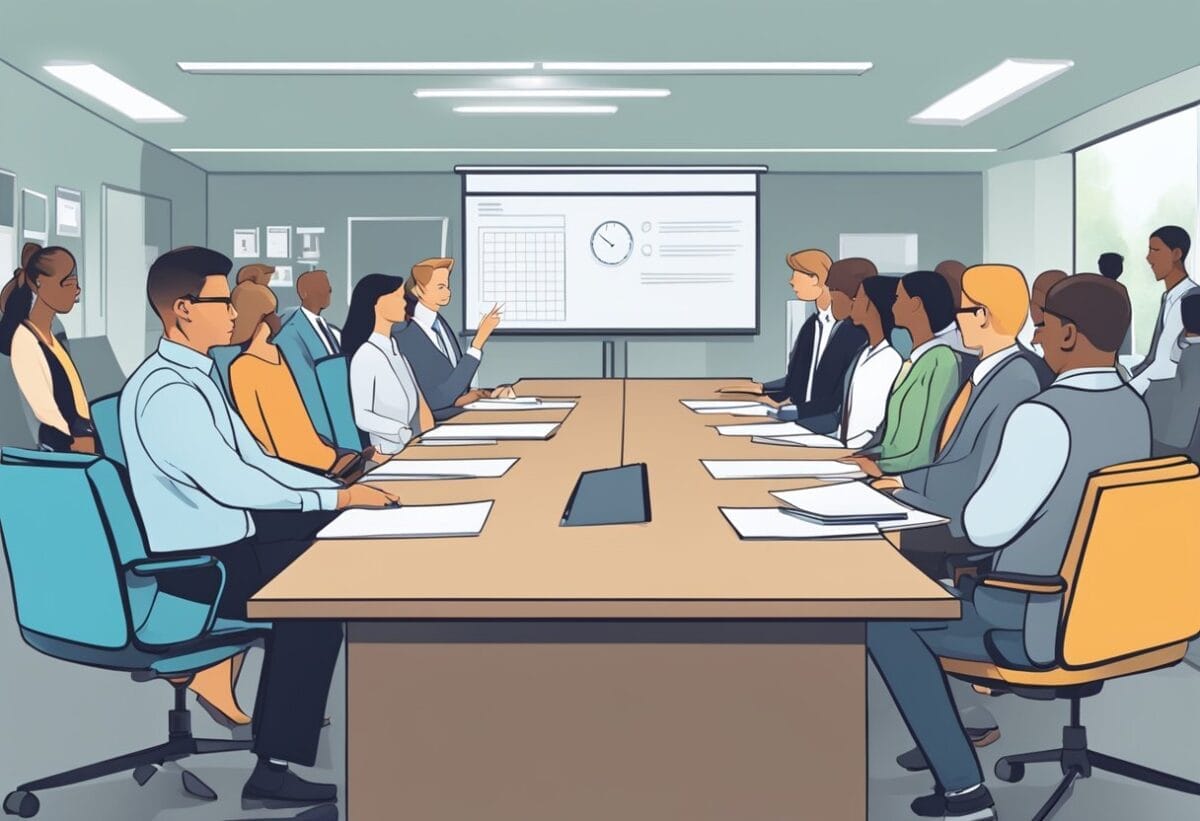Skip-level meetings helps to bridge gaps between different levels of an organization’s hierarchy. They connect you with leaders who are typically beyond your immediate supervisor.
- Meeting to present ideas to challenges
- Meeting to seek guidance from experienced professionals
- Meeting to build meaningful relationships with upper management.
A well-prepared employee enters a skip-level meeting not only to engage in dialogue but also to listen actively and absorb wisdom from experienced leadership.
By appropriately preparing, you can create a favorable impression that underscores your value and commitment to the company’s goals.
KEY TAKEAWAYS
- A skip-level meeting connects you with leaders above your direct supervisor.
- Preparation is key to making a positive impression during these dialogs.
- Engage actively and demonstrate your commitment to the organization’s objectives.
What is Skip-Level Meeting in The Workplace?
A skip-level meeting bridges the gap between you and senior leaders, bypassing immediate management. This unique setup provides a direct communication channel up the organizational ladder. You should see these meetings as a channel of open communication with your senior management as well as a form of “interview” you have with a senior management.
You can expect your skip-level meeting in one of these 4 formats:
- You are meeting 1:1 with a member of the senior management team.
- You are meeting one to a few senior management team members.
- You and a few others are meeting with a member of the senior management team.
- You and a few others are meeting with a few senior management team.
Regardless of the meeting arrangement, a personal from Human Resources is most likely to be present as well.
To be prepared, you should have a bullet-pointed lists or clear agendas that can guide the conversation, ensuring you cover all intended topics without deviating from the core purpose of the meeting.
You want to position yourself as a proactive and invested team member.
How Are Skip-Level Meeting Different From Other Types of Meetings?
Skip-level meetings are not your average online team meeting.
Unlike regular meetings, these sessions connect you to a senior leader—someone several levels above your direct supervisor in the organizational hierarchy. Here’s how they stand out:
- Direct Line of Communication: You get to share feedback, concerns, and ideas directly with top-tier leadership, without the filter of middle management.
- Insightful Exchange: It’s a chance to gain insights into the broader organizational goals and strategies from those steering the company.
- Personal Growth Opportunity: For you, it’s a platform to be noticed by the leadership, showcasing your potential and commitment to the company’s success.
- Leadership’s Pulse Check: For the senior leader, these meetings are a way to gauge the health of the company culture and employee satisfaction, ensuring alignment with the organizational vision.
What are the Benefits of Skip-Level Meeting For Employees?

Skip-level meetings can be a strategic pathway to professional growth within a company. They allow you to engage directly with leaders several steps above your immediate manager. This can lead to increased visibility and broader perspective on the company’s direction.
By participating in a skip-level meeting, you can enjoy several benefits:
- Open Communication: You’re given a platform to voice your thoughts. It’s an opportunity to provide feedback that may not be captured in regular one-on-one sessions with your direct supervisor.
- Career Development: Exposure to higher management can illuminate potential career paths. This is the chance to demonstrate your skills and career aspirations.
- Networking: Building relationships with upper management often translates into stronger professional networks.
- Direct Insight: These meetings can provide clarity on company-wide strategies, potentially influencing your daily tasks.
- Recognition: They offer a chance to be recognized by key decision-makers, which can open doors for future advancement.
How to Prepare for Skip Level Meeting as an Employee or Participant?

When preparing for these meetings, consider using appropriate meeting software to ensure the conversation flows smoothly, especially in remote work settings. This not only helps in staying organized but also demonstrates your professionalism.
Approaching this meeting with a structured plan can help you harness the potential to make a lasting impact.
1. Know Who You Are Meeting
Understand who will be in the meeting with you.
- Are you meeting with your boss’s boss?
- Are you meeting with department head?
- Are you meeting with a senior management from another department?
- Are you meeting with your general manager or CEO of your company?
- Are you meeting with the head of human resource of your company?
Research their roles, interests, and background. This knowledge will guide your communication style and help to establish rapport.
Your awareness shows respect and preparation for the meeting.
2. Know Your Objectives and Goals of Your Meeting
Define clear objectives and career goals to discuss.
- Are you seeking guidance?
- Are you looking to understand company direction?
- Are you looking to present your achievements?
Clarity on your goals ensures a focused agenda, making the time spent productive.
3. Prepare a List of Questions and Discussion Points
Create a prioritized list of questions that align with your objectives.
Think about the insights you’re seeking and how they connect to your role and growth.
- Questions related to your job role.
- Questions related to your company’s future.
- Questions related to how you can further contribute to the company.
Your questions should invite dialogue and show your eagerness to learn.
4. Think of Things You Like or Love to See Improvement
Self-reflect on the positives as well as areas needing enhancement in the company.
Be ready to highlight your willingness to contribute to the success of the company. Your constructive view on improvement signifies maturity and ambition.
5. Prepare Solutions to Underlying Issues
If you’re addressing challenges, propose your own solutions.
This initiative demonstrates problem-solving skills and a proactive mindset.
When meeting with an upper management, never post an issue without a solution. You are hired to give solution and resolve issue, and not just identifying issues.
Directing the conversation to solutions fosters a constructive atmosphere.
6. Prepare Answers to Potential Questions
Anticipate and prepare for questions about your performance, experiences, and aspirations. Possible questions that maybe asked are:
- “What are you 5-years plans in the company?”
- “What is your proudest achievement in the company?”
- “What is the ONE thing you would like to change in the company?”
- “What is the ONE thing you like about the company?”
- “Will you recommend your friends to come work in the company?”
Preparing responses showcases your self-awareness and commitment to your career path. Your confidence will shine through.
7. Prepare to Request For Feedback
End the meeting by asking for feedback.
By proactively asking for feedback, it speaks to your dedication to self-improvement and professional development.
This closure can reinforce your ongoing dialogue with upper management, keeping communication channels open and dynamic.
How to Conduct Yourself During a Skip-Level Meeting as an Employee?

Approaching a skip-level meeting with professionalism and openness paves the way for meaningful dialogue and mutual benefit.
This is the time for you to build rapport, share ideas, and gain insights from higher management while demonstrating your value to the company.
1. Build Rapport
Start the meeting by engaging in small talk to establish a comfortable atmosphere.
Engagement from the onset sets a positive tone, making an authentic connection more likely. It’s important to show genuine interest in the conversation and actively listen to what the skip-level manager has to say.
2. Be Objective When Sharing Ideas and Concerns
Communicate your thoughts clearly and objectively.
- Focus on facts and objective ideas
- Refrain from emotional bias when discussing ideas or concerns.
Open communication is key – offer constructive feedback and solutions where possible, which shows you’re solution-oriented and invested in the company’s success.
3. Be Respectful and Humble
Maintain a demeanor of respect, acknowledging the seniority of your audience without seeming intimidated.
Humility goes a long way; it communicates your openness to trust and learning, which are crucial for personal growth and demonstrating your professionalism.
4. Take Notes on What Have Been Discussed
Document key points discussed during the meeting.
Note-taking helps you track the communication flow and ensures you don’t miss out on any important details. This will also aid you in following up on any commitments or actions post-meeting.
5. Wrap Up and Thank Your Senior Management for Their Time and Insights
As the meeting concludes, succinctly summarize your takeaways to confirm understanding.
Express gratitude for the opportunity – showing appreciation can foster a positive relationship with senior management and leave a lasting positive impression.
Things to Do After the Skip-Level Meeting

Once the skip-level meeting concludes, your work isn’t done. Your focus should shift to leveraging the insights gained to advance your career and enhance workplace communication.
1. Reflecting on the Meeting
Set aside time for reflection. Go over your notes or the meeting’s transcription to identify key points.
- “Did you receive any specific feedback aimed at your career growth?”
- “Is there anything you may want to discuss on your next skip-level meeting?”
- “Are there any follow-ups you need to do after the meeting?”
Highlight actionable items that could improve your productivity and jot down any follow-up questions.
2. Create a Plan for Improvement Based on Your Feedback
Start shaping your future now. Transform the feedback into a clear plan with defined steps. Your career growth thrives on continuous improvement.
- Week 1-2: Focus on quick wins that show immediate productivity enhancements.
- Week 3-4: Implement deeper changes in your work processes, as suggested.
- Ongoing: Regularly revisit and adjust your plan to ensure it remains relevant and effective.
3. Maintaining Open Lines of Communication
Keep the dialogue flowing. Reach out to your skip-level manager to express gratitude for the meeting and affirm your commitment to the discussed improvements.
Establish a schedule for periodic follow-ups to update on your progress and seek additional guidance. This will solidify your relationship and show your dedication to professional growth.
Things Not to Do During Skip-Level Meeting

When you’re part of a skip-level meeting, it’s your chance to shine and show that you’re engaged with your company’s vision.
However, there are certain actions you should avoid making the most of this opportunity. Here’s a guide on what not to do during your skip-level meeting.
Common Skip-Level Meeting Mistakes
- Avoid Being Unprepared: Walking into the meeting without a game plan is a no-go. Have your questions and topics ready to show that you value this time.
- Don’t Dominate the Conversation: This is a dialogue, not a monologue. Allow space for your skip-level manager to share insights and ask their own questions.
- Do Not Bring Up Petty Issues: Focus on big-picture topics rather than minor day-to-day gripes that your direct manager can handle.
Communication Missteps
- Resist Negative Speaking: Avoid bad-mouthing colleagues or management; keep the conversation constructive.
- Don’t Be Overly Casual: Maintain a professional demeanor—this is still a business setting, even if it feels more relaxed.
Post-Meeting Pitfalls
- Never Ignore Follow-up Actions: If tasks are assigned, take them seriously. Your follow-through will be noticed.
- Dismissing Feedback: If you receive advice or constructive criticism, show appreciation and reflect on how you can implement it.
Pro Tip: Skip-level meeting is a unique chance to engage with higher management. Approach it with the right mindset, and you can make it a stepping stone in your career.
Questions to Ask During Skip Level Meetings as an Employee (Participant)

When preparing for a skip level meeting, it’s key to bring insightful questions. These questions should reflect genuine curiosity and a desire to understand the larger organizational picture. Your approach conveys your professional investment in your career growth and your interest in the company’s direction.
Objectives
Start by seeking clarity on the company’s future plans. Ask,
- “What are the immediate objectives for our team?”
This question shows you’re thinking strategically.
Expectations
Inquiry about expectations.
- “How can I exceed the current expectations in my role?”
These question signals a proactive mindset.
Insight
Probe for insights that are not visible in your current role.
- “Can you share insights into the biggest challenges our organization faces?”
This question exposes you to a broader perspective.
Communication
Understanding communication flow is essential.
- “How can I improve communication with my direct manager to better support our team’s goals?”
This demonstrates your commitment to teamwork.
Career Goals
Express your professional ambitions with,
- “What skills should I develop to advance my career within the company?”
Tips on Asking Questions
Your questions should lead to dialogue that benefits both your professional development and the organization’s success. Prioritize concise communication that reflects your preparation and eagerness to engage meaningfully.
- Convey your appreciation for the opportunity to have a skip level meeting.
- Express your readiness to contribute and learn.
- Maintain an inspirational and approachable demeanor.
This mindset can make a lasting impression and set the stage for your continued progress within the company.
Questions to Ask During Skip Level Meetings as the Manager (Host)

When preparing for a skip-level meeting, clarity is crucial. You aim to foster open communication and gain insight. You also want to discuss career goals. Here’s a guide to crafting your questions effectively.
Setting the Stage
Begin with a simple question such as,
- “How are you finding the work environment and support from your immediate team?”
Insight on Performance
Ask your participant,
- “Can you share how your current projects align with your personal and professional development goals?”
Fostering Growth
Probe more information with question,
- “What skills would you like to enhance, and how can we assist you in that learning process?”
Understanding Barriers
Seek clarity on obstacles,
- “Have you encountered any challenges that hinder your workflow or professional growth?”
Aligning Objectives
Align their goals with company’s vision,
- “What do you believe would be the next step in your career path within our organization?”
Encouraging Open Dialogue
Encourage honesty,
- “What feedback do you have on our current projects or strategies that you believe could drive improvement?”
Tips on Asking Questions
By posing these questions, you emphasize that their voice matters. This can boost morale and inspire dedication.
Your empathetic professionalism opens doors to meaningful dialogue, charting a path for joint success.
Every question you asked is a bridge towards a stronger relationship and deeper understanding of your team’s aspirations and needs.
- Keep the conversation approachable and let them know their input is pivotal.
- Your aim is to motivate and guide your team members towards their fullest potential.






